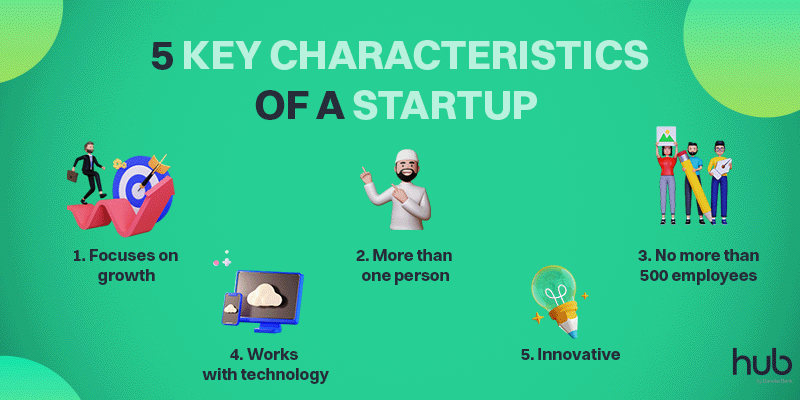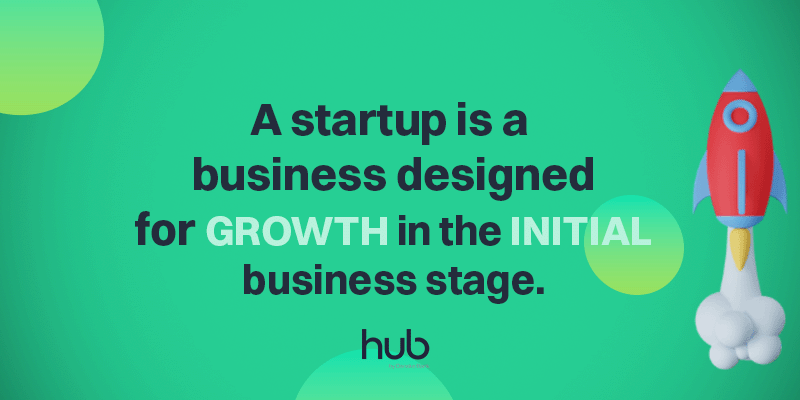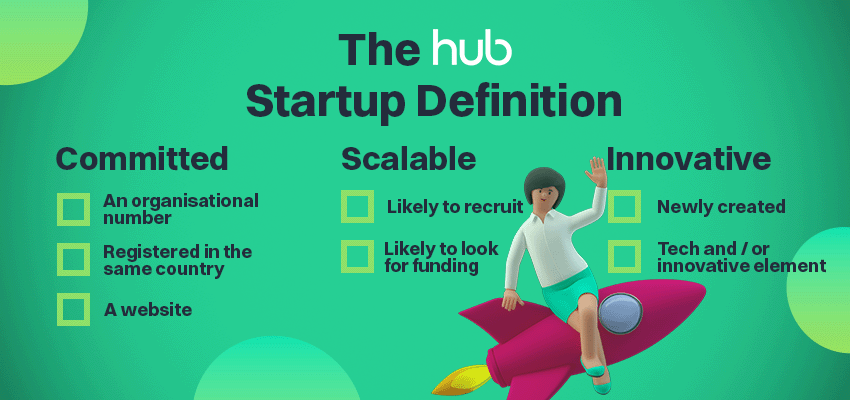What is a Startup? the Hub definition
The term “startup” was originally coined in the early tech revolution in the 1970s, referring to a new breed of small companies with astonishing growth potential. “Startup” however became a popular term in the 1990s and early 2000s business boom with brands like Microsoft or Apple scaling up at a faster pace than ever seen before.
Despite the relatively clear etymology of the term, there has never been a real consensus to define “startup”. The first startup definitions stem from Venture Capitalists. It is the criteria to identify the companies with the best potential for the investors. Whereas now the search for the ultimate definition of “a good startup” is joined by accelerators, corporations and academia – all with their particular viewpoints.
In this blog post, we’re first breaking down the most commonly held key characteristics of a startup. Second, we’re revealing the very definition we use to decide who gets to join the Hub and who does not. So, if you are thinking of joining, scroll down here for the tick boxes.

5 Key Characteristics of a Startup
1. Startups focus on growth
Startups are not like any other small companies in one crucial aspect: startup founders and their teams aim for one thing, and one thing only: growth.
A startup is by definition a company that is designed to grow. What growth is and how it looks like depends on the phase the startup is at in the Startup Financing Cycle. In the first phases, startups often lose money while growing their customer base, team and/or valuation, whereas in the latter stages after breaking even growing revenue is the key.
A typical growth journey for a startup includes 4 main steps:
- In the beginning, startups rely on initial capital acquired through for instance accelerators, crowdfunding, angel investors or even friends & family. In this initial phase, the startup is using the capital to build a sufficient product and hire a team to generate revenue.
- After the investment, most startups hit the so-called Valley of Death. They are not making enough money to return the initial capital investment. It’s still growing but the company costs are far greater than its current revenue.
- Ideally, at some point, the startup will generate enough revenue to return the initial investment. Then it can shift its sights from generating “enough money to pay back” to “more money we could’ve ever thought off”. At this phase, most startups foster an increased pace of growth through strategic alliances, acquisitions or additional funding through Venture Capital or crowd-sourcing.
- Once a startup is on a solid growth trajectory, it will consider opening the company to the public with pre-IPOs, IPOs and further, secondary offerings.
2. Startup consists of more than 1 person
Let’s start with the obvious: you need a team to call your business “a startup”. As Startup Commons put it quite beautifully, “Entrepreneur is an individual, a startup is an entrepreneurial team.” Moreover, according to the CB insights, the 3rd cited reason startups fail is that they did not hire the right people. You can start a business alone, but to grow you will need the right people on board – being employees, freelancers or co-founders.
3. Startups cannot consist of more than 500 people
The true size of a startup team is a little more ambiguous: do you stop being a startup the moment your employee count exceeds 30? Or is 50 where to draw the line? To draw the line on 500, we’ve benchmarked Alex Wilhelm’s famous calculations. He argues for the cap of 500 based on Crunchbase’s publication from 2016 that most unicorns with $1 million to $2.5 billion valuations employ approximately 600 people. At the Hub some of the big players, yet still below 500 employees, including for instance Labster (100+ hired),Naava (50+ hired) and Pleo (100+ hired).

4. Startups work with technology
Returning to the introduction of this blog post, the term startup itself was coined during the technological revolution. Today it is true that startups still tend to work with software. But more and more startup businesses also focus on solutions that have seemingly nothing to do with technology.
These relatively “low-tech” startups are often next-generation impact startups: for instance, Planet Nusa transforms fish nets into beautiful sportswear or Entis introduced crickets into the Nordic food scene. Neither of these startups works directly in creating technological solutions – but depending on emergent technologies/trends they bring new concepts to life.
Therefore it can be said that startups do work with tech, even though the product is not technical in itself.
5. Startups are innovative
The basic rule of thumb is: Startups find new, scalable solutions to known problems. Be it a completely new product, service in a new place, monetization in a new form, or delivery in a new way, innovation in one of its forms is the key to startup success. So far we’ve seen at the Hub for instance startups creating plastic-like packaging out of wood, adding sensors to gym equipment to track your progress or even bringing the first generation of drone deliveries to Denmark. It doesn’t get more innovative than that!

The Hub Startup Definition
At the Hub, we have our own criteria for screening the companies wanting to join the platform. These criteria are centred around 3 core themes: commitment, scalability & innovation
Committed
The company needs to exist as a legally registered company. Therefore we expect the startups joining our platform to have:
- An organisational number: as proof of company registration(in Sweden, a personal ID is enough)
- Registered company: in each country, they are applying.
- A website: a digital footprint for talent and investors to look up.
Scalable
The company needs to showcase its ambitions and abilities for growth. Therefore we accept companies that are:
- Likely to recruit: as opposed to one-person initiatives that aren’t likely to recruit.
- Likely to look for funding at some point: likely to scale 10x via external funding as originally planned by VCs when introducing the term in the 1970s.
Innovation & Tech
As established in the prior, startups are usually new in the market and make use of technology:
- No more than 10 years of age: Startups are businesses at the beginning of their life.
- Showcase tech and/or innovation element: As discussed in key characteristics, not all startups have tech at their core. Examples of non-tech heavy startups who are welcome to join: Design, Consumer Goods, E-commerce and Digital Market Places with proven track records and scaleable impact startups.
Conclusion
As established in this blog post, startup definitions tend to be subjective and relative by nature. There is no one objective fit to define for all. It is crucial for you and your startup to identify what is your innovative solution or your startup life cycle story and capitalize on it. There is a reason why pitch decks tend to have a format covering everything from the problem to the solution to the team composition – these topics are, after all, the things that help any investor to identify “a good startup”.